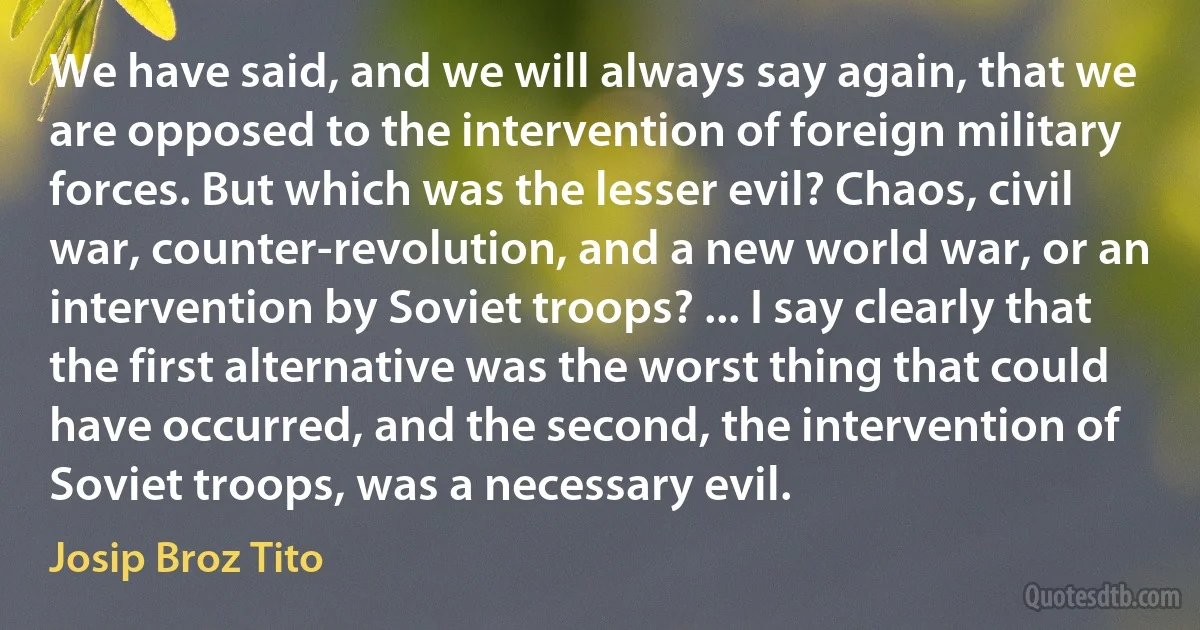Military Quotes - page 42
Such a weapon goes far beyond any military objective and enters the range of very great natural catastrophes. By its very nature it cannot be confined to a military objective but becomes a weapon which in practical effect is almost one of genocide. It is clear that the use of such a weapon cannot be justified on any ethical ground which gives a human being a certain individuality and dignity even if he happens to be a resident of an enemy country... The fact that no limits exist to the destructiveness of this weapon makes its very existence and the knowledge of its construction a danger to humanity as a whole. It is necessarily an evil thing considered in any light.

Enrico Fermi
Rather in time of war the citizen must be more alert to the preservation of his right to control his government. He must be most watchful of the encroachment of the military upon the civil power. He must beware of those precedents in support of arbitrary action by administrative officials, which excused on the plea of necessity in wartime, become the fixed rule when the necessity has passed and normal conditions have been restored.

Robert M. La Follette Sr.
The crucial question for us is not whether they have a theocratic government. I'd personally prefer not, but I can think of a lot of places where I'd prefer not, like here. But, the question is whether the US will agree to let Iraq alone. That means to make it very clean and explicit, both in word and in action, that the US will withdraw, set a timetable for it, will not influence what goes on in Iraq, will not leave military bases, will let the country go off on its own. I think we also ought to pay massive reparations, but I'll stop short of that. Those are the crucial issues. It's not up to Rumsfeld what kind of government they have, it's up to him to get out.

Noam Chomsky
The threat of China is not military. The threat of China is they can't be intimidated... Europe you can intimidate. When the US tries to get people to stop investing in Iran, European companies pull out, China disregards it. You look at history and understand why - they've been around for 4,000 years, they have contempt for the barbarians, they just don't give a damn. OK, you scream, we'll go ahead and take over a big piece of Saudi or Iranian oil. And that's the threat, you can't intimidate them - it's driving people in Washington berserk. But, you know, of all the major powers, they've been the least aggressive militarily.

Noam Chomsky
The most important victory, in fact, was in Indonesia. In 1965 there was a military coup, which instantly carried out a Rwanda-style slaughter, and it's not an exaggeration. Rwanda-style slaughter, which wiped out the only mass-based political organization, killed mostly landless peasants, and instituted a brutal and murderous regime. There was total euphoria in the United States. So happy, they couldn't contain it. When you read the press, it was just ecstatic. It's kind of suppressed now because it doesn't look pretty in retrospect, but it was understood. Years later, McGeorge Bundy, who was the national security advisor, recognized that, he said, and I think he's right, the U. S. should have stopped the war in Vietnam in 1965, because we basically won. By 1965 South Vietnam was largely destroyed, most of the rest was going to quickly be destroyed, and we had saved the major prize, Indonesia. The rot wasn't going to spread to Indonesia after this delightful Rwanda-style slaughter.

Noam Chomsky
I think that the polls taken in Baghdad explain it very well, they seem to understand. The United States invaded Iraq to gain control of one of the major sources of the world's energy, right in the heart of the world's energy producing regions. To create, if they can, a dependent client state. To have permanent military bases. And to gain what's called "critical leverage” - I'm quoting Zbigniew Brzezinski - to gain critical leverage over rivals, the European and Asian economies. It's been understood since the Second World War, that if you have your hand on that spigot, the main source of the world's energy, you have what early planners called "veto power” over others. Iraq is also the last part of the world where there are vast, untapped, easily accessible energy resources. And you can be sure that they want the profits from that to go primarily to U. S.-based multinationals and back to the U. S. Treasury, not to rivals. There are plenty of reasons for invading Iraq.

Noam Chomsky
Control of thought is more important for governments that are free and popular than for despotic and military states. The logic is straightforward: a despotic state can control its domestic enemies by force, but as the state loses this weapon, other devices are required to prevent the ignorant masses from interfering with public affairs, which are none of their business.

Noam Chomsky
To gain control over this resource, and have probably military bases there, is a tremendous achievement for world control. You read counter-arguments to this, and they're worth looking at. So it's argued that it can't be true, because the costs of reconstruction are going to be greater than the profits that will be made. Well, maybe that's true, maybe it isn't, but it's totally irrelevant. And the reason is because the costs of reconstruction are going to be paid by the taxpayer, by you, and the profits are going to go right into the pockets of the energy corporations. So yeah, it doesn't matter how they balance out, it's just another taxpayer subsidy to the rich.

Noam Chomsky
Dayan's correct assumption was that the boss in Washington might object formally, but with a wink, and would continue to provide the decisive military, economic and diplomatic support for the criminal endeavors. The criminality has been underscored by repeated Security Council resolutions, more recently by the International Court of Justice, with the basic agreement of U. S. Justice Thomas Buergenthal in a separate declaration. Israel's actions also violate U. N. Security Council resolutions concerning Jerusalem. But everything is fine as long as Washington winks.

Noam Chomsky
Venezuela's political polarization is not new; the country has long been divided along racial and socioeconomic lines. But the polarization has deepened in recent years. This is partly due to US support for an opposition strategy aimed at removing the government of Nicolás Maduro through extra-electoral means. While the opposition has been divided on this strategy, US support has backed hardline opposition sectors in their goal of ousting the Maduro government through often violent protests, a military coup d'etat, or other avenues that sidestep the ballot box.

Noam Chomsky
On September 20, 1792, Johann Wolfgang von Goethe (who had accompanied the Duke of Weimar on a military expedition to Paris) saw the finest army of Europe inexplicably repulsed at Valmy by some French militiamen, and said to his disconcerted friends: "In this place and on this day, a new epoch in the history of the world is beginning, and we shall be able to say that we have been present at its origin." Since that time historic days have been numerous, and one of the tasks of governments (especially in Italy, Germany, and Russia) has been to fabricate them or to simulate them with an abundance of preconditioning propaganda followed by relentless publicity.

Jorge Luis Borges
Socrates: Shall we set down astronomy among the objects of study? Glaucon: I think so, to know something about the seasons, the months and the years is of use for military purposes, as well as for agriculture and for navigation. Socrates: It amuses me to see how afraid you are, lest the common herd of people should accuse you of recommending useless studies.

Socrates
We all agree that the seceded States, so called, are out of their proper relation with the Union; and that the sole object of the government, civil and military, in regard to those States is to again get them into that proper practical relation. I believe it is not only possible, but in fact, easier to do this, without deciding, or even considering, whether these States have ever been out of the Union, than with it. Finding themselves safely at home, it would be utterly immaterial whether they had ever been abroad. Let us all join in doing the acts necessary to restoring the proper practical relations between these States and the Union; and each forever after, innocently indulge his own opinion whether, in doing the acts, he brought the States from without, into the Union, or only gave them proper assistance, they never having been out of it.

Abraham Lincoln
The persons excepted from the benefits of the foregoing provisions are all who are, or shall have been, civil or diplomatic officers or agents of the so-called confederate government; all who have left judicial stations under the United States to aid the rebellion; all who are, or shall have been, military or naval officers of said so-called confederate government above the rank of colonel in the army, or of lieutenant in the navy; all who left seats in the United States Congress to aid the rebellion; all who resigned commissions in the army or navy of the United States, and afterwards aided the rebellion; and all who have engaged in any way in treating colored persons or white persons, in charge of such, otherwise than lawfully as prisoners of war, and which persons may have been found in the United States service, as soldiers, seamen, or in any other capacity.

Abraham Lincoln
Patel's presidential address to the Congress, 1931: No one would die of starvation in independent India. Its grain would not be exported. Cloth would not be imported by it. Its leaders would neither use a foreign language nor rule from a remote place 7,000 feet above sea level. Its military expenditure would not be heavy. Its army would not subjugate its own people or other lands. Its best-paid officials would not earn a great deal more than its lowest-paid servants. And finding justice in it would be neither costly nor difficult.

Sardar Vallabhbhai Patel

![Say, take Rachel Corrie, local young woman, she was extremely courageous. She's a martyr for peace and justice. We happened to kill her too, even if we don't like to admit it. She was killed by U. S. sent equipment, which is Caterpillar...
[Q: you draw that line right back to you and me sitting here? ] Absolutely, we're responsible for it. I mean, we didn't drive the bulldozer, but why is it there? What's it doing? Who provides the military, economic, and diplomatic support for destroying the occupied territories? (Noam Chomsky)](https://cdn.quotesdtb.com/img/quotes_images_webp/84/noam-chomsky-bulldozer-caterpillar-459184.webp)

